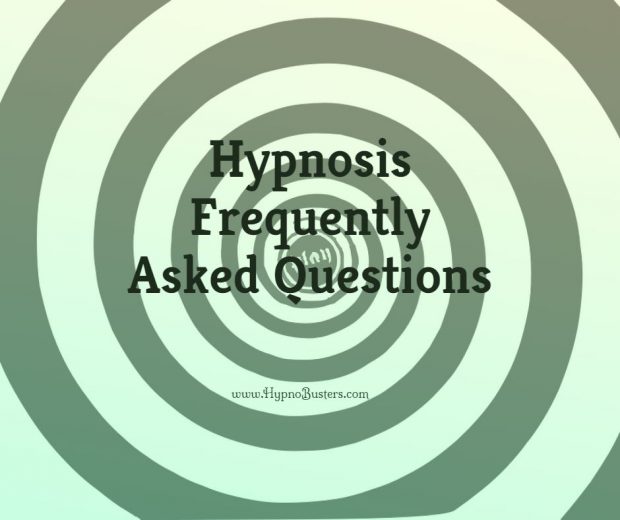There is a lot of confusion and plain inaccurate regarding hypnosis and hypnotherapy. This is largely down to media hyping what hypnosis is really like.
A story about how someone was hypnotised into giving their bank card to a stranger (which is not possible) makes for a better story than the realities of hypnosis.
So to help you, here are the answers to some frequently asked questions on hypnosis. Hypnosis FAQ…
(Scroll down to see my hypnosis FAQ video)
Can I be hypnotized?

Jon Rhodes
In my experience, anyone can be hypnotized. Some can be hypnotized to a deeper level than others, but everyone can to some degree. That is unless you do not wish to be.
It is easy to resist a trance. Sometimes people think it’s a sign of weakness if you go into a hypnotic trance. This is the wrong way of thinking about it.
A hypnotherapist is a guide. Their job is to help you go into the natural hypnotic state. It is usually the more open minded, creative and brave people that allow themselves to deeply relax. Anyone can resist it – it’s nothing special.
New research, developed by board-certified hypnotist Gerald Kein, claims that everybody is equally hypnotisable and that “people accept hypnosis in direct relationship to the amount of fear they have”.
Please CLICK HERE To Check Out My Collection Of Hypnosis MP3 Sessions
What is a hypnotic trance?
There is no precise definition. The American Society of Clinical Hypnosis’s web site says “Hypnosis is a state of inner absorption, concentration and focused attention.”
Hypnosis is a normal and natural state that most of us experience several times a day. Have you ever driven somewhere and not remembered the journey? You were probably in a light trance state whilst driving.
Trance also occurs when reading a book or watching TV. Sometimes you can be so absorbed in the book or TV programme that you are not consciously aware what is going on around you.

Will I be asleep when hypnotised?
You will not be asleep when in a hypnotic state. The word hypnosis comes from the ancient Greek word “hypnos”, meaning sleep. Hypnosis is generally a very relaxed state but it is not sleep.
James Braid came up with the term, but sought to change it to “monoideaism” (“single-idea-ism”), when he realised that it was not a form of sleep.
What does hypnosis feel like?
When in a trance you usually feel more mentally and physically relaxed. It is a pleasant experience, and you are fully in control. You can hear exactly what is going on around you, unless you choose to drift your attention away.
You become aware that you can easily stand up, talk, or move if you want. A lot of people (me included) when they first experience a hypnotic trance move their fingers or hands in order to test whether they can move at will. It is comforting to know that you can!
Occasionally a patient can be a difficult to wake up. This is not a bad thing. It is because the patient doesn’t want to wake up as it feels so pleasant. Soon they become bored and wake up. One trick the old hypnosis pro’s use is to tell the patient that they are charging for the time. It’s amazing how quickly they then wake up!
No one has ever been stuck in trance, despite what the media sometimes portrays.
Is hypnosis dangerous?
In 1955 the British Medical Association set up an inquiry which favourably reported hypnosis as a therapeutic tool. It even recommended that it should be taught at medical schools.
Hypnosis was also approved by the Council of Mental Health of the American Medical Association in September 1958 as a safe practice with no harmful side effects. Since then there has been acceleration in the establishment of hypnosis societies for doctors, dentists, and psychologists.
No one has been seriously hurt with hypnosis. If it were dangerous, then we would all be in potential trouble each time we watch a film, or read a book, since it is common to go into trance in these situations.
Are meditation and hypnosis different?
Yes. Meditative states are similar, but the practice of hypnosis is significantly different. Meditation aims to ‘empty’ your mind of conscious thought, whereas hypnosis aims to add ‘post hypnotic suggestions’. They might be ‘eat healthily’, ‘stay motivated’, ‘keep calm and relaxed’ etc.
With hypnosis there is usually the aim of a specific change. Hypnotherapists often employ meditation techniques to get their patients into ‘trance’. They then extend this by ‘deepening’ the subject, and offering them suggestions they have previously agreed on.
Can I be made to do things against my will?
You could never be made to do anything against your will or contrary to your value system. If this was possible there would be criminals learning hypnosis in order to hypnotise their bank managers to opening the vaults and handing over cash!
In a trance, you would not unknowingly reveal your deepest secrets. You can even lie when in a trance, which is one reason why testimony in hypnosis is not permissible evidence in a court of law. It is only used by police to help with investigation.
A person will only act upon suggestions that serve them in some way or reinforce an expected behaviour, anything else their unconscious will ignore. Most people develop these misconceptions from seeing or hearing a Stage Hypnosis show. However they largely achieve their results from showmanship, selection of the more extrovert people, and peer pressure.
How long will it take before I notice a change?
This varies from person to person. However in one session, you can expect to become more relaxed than you are right now. Most people do not relax enough, and some people never seem to relax. Being more relaxed can help most mental and physical problems that you may have, even before we get to the therapy part of the session.
I have often had patients report back that friends and family noticed that they seemed more relaxed after just one session. In the past I have helped people with problems such as IBS, skin complaints, and addictions, simply by doing relaxation work.
Hypnosis can bridge the gap between your head and your heart, making your goals much more compelling, and increasing your chances of permanent change. Depending upon the intensity and number of sessions, you will notice suggestions for the desired behavioural changes popping into your conscious mind almost immediately.
Please keep an open mind when deciding whether to use hypnotherapy. I have been a clinical hypnotherapist, trained by the London College of Clinical Hypnotherapy (LCCH), for many years. During this time I have witnessed many things that, quite frankly amaze me at times! I have helped so many people in so many ways, that I feel it would be such a shame for people to opt out simply due to unfounded fear and misinformation.
Make sure you find a therapist that has received good training from a well respected body, and you will not be disappointed. It is not perfect. Hypnosis does not solve everything all the time. However it does help almost all of the time, and can create amazing changes.
With a well qualified practitioner, you are pretty much guaranteed a comforting, relaxing, and enjoyable therapeutic experience, as well as a shot at gaining good ground towards your goals.
Hope you enjoyed my hypnosis FAQ – Hypnosis Frequently Asked Questions
Please CLICK HERE To Check Out My Collection Of Hypnosis MP3 Sessions

